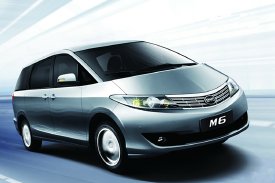UV-resistant grades of Sarlink thermoplastic vulcanizate (TPV) elastomer provide weight and cost savings for the roof seals of the new M6 seven-seat multipurpose vehicle built by China's BYD Auto, it was announced today by the Thermoplastic Elastomer Division of Teknor Apex Company.
The seals run the length of the vehicle roof on either side and contribute to the stylish, streamlined look of the M6 model. Each is a coextrusion onto a sheet metal strip of two Sarlink compounds, 5790B4 and 5765B4, with Shore A hardnesses of 87 and 65, respectively. The seals are snapped into place during vehicle assembly.

Replacing the EPDM thermoset rubber often used in exterior automotive seals, the seals produced from Sarlink TPV weigh 25% less, saving a total of 0.15 kg per vehicle, according to Teknor Apex's Mr. Ting Wang, business development manager. He also cited the economic and environmental advantages of using a thermoplastic: "A key reason why Sarlink TPV has been replacing EPDM is that it eliminates the labor- and energy-intensive vulcanization step required in the processing of thermoset rubber," said Mr. Wang. "Another important advantage is the recyclability of both process scrap and finished components."
The seals were in development for two years in a cooperative program between BYD and the Shanghai-based Sarlink TPV team, noted Mr. HongQing Wang, technical service specialist for Sarlink TPVs, who added that the project represented the first TPV sealing application for BYD. (The Sarlink team is now part of Teknor Apex since the company purchased the Sarlink business from DSM on November 1.)
"The Sarlink group not only supplied us with high-quality materials but also provided us with information on TPV application, including positive and practical advice on tooling design, the extrusion process, and the production line," said Mr. Hou Zheng-yu, manager of the production department at BYD's rubber operation.
Sarlink TPVs are based on proprietary technology that yields compounds with outstanding rubber-like properties while enabling them to be processed at high rates like any other thermoplastic. The performance profile of Sarlink TPVs offers important advantages over standard TPVs and other widely used thermoplastic elastomer compounds, including high flexural fatigue resistance, low compression set, outstanding heat resistance, high impact strength, and excellent resistance to chemicals, ozone, and UV.